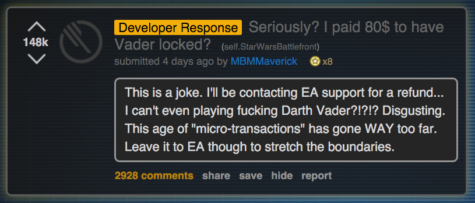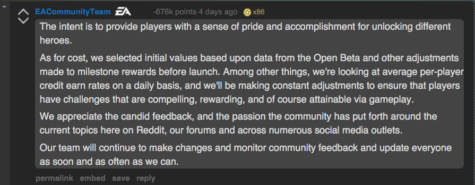Video Game Publisher, Electronic Arts (EA), received harsh complaints from consumers regarding it’s new Star Wars game, “Battlefront 2.”
EA came under fire for incorporating microtransactions, called ‘lootcrates’. This system lets you unlock randomized boosts to your online loadout. Lootcrates also give you credits, which are used to unlock playable heroes like Darth Vader or Luke Skywalker. Crates are unlocked through gameplay, or they can be purchased for roughly $1.60 each.
These microtransactions are becoming a common occurrence in video games produced by large studios like EA on computer and mobile platforms. The issue came from the number of credits needed for an unlock.
Soren Kamper, a writer for a Star Wars gaming website, calculated that it would take more than 40 hours of gameplay to unlock one hero. To unlock everything in the game? A whopping 4,528 hours. Paying money for lootcrates is an easy way to circumnavigate this grind. Gamers are saying that the system incentivises paying for crates to avoid sinking unnecessary hours into the game.
EA has been in contact with the community following the release of the credit and time requirements for heros. Early Monday morning, the EA PR Reddit account replied to angry Reddit user MBMMaveric’s post titled, “Seriously? I paid $80 to have Vader locked?”
EA claimed in their response that the 40 hour grind for a single character was meant to “provide players with a sense of pride and accomplishment for unlocking different heros.” The comment received roughly 680 thousand downvotes, the most in Reddit history by over 600 thousand.
Gamer and Battlefront fan Dante Devencenzi, 20, called it, “Disappointing.”
Devencenzi felt let down upon learning of the lootcrates, stating, “I hoped they could bring some life back into the series. I guess EA is doomed to use profit-driven game setups.”
EA was one of the first brands to integrate lootcrates and microtransactions into its games, starting in 2012 with “Mass Effect 3”. Credits purchased in that game with real money could upgrade your character to make them more powerful in the game’s online content.
In 2013, EA announced that it would be placing some form of microtransactions into all of its games moving forward. Backlash has been constant for EA because of these microtransactions. Some gamers label the games ‘pay-to-win,’ others don’t even bother picking them up. Following the massive community outcry, EA released a statement to appease its disgruntled fan base.
John Wasilczyk, Executive Pr at Dice (the team who worked with EA to produce the game) said, “Unlocking a hero is a great accomplishment in the game, something we want players to have fun earning. We used data from the beta to help set those levels, but it’s clear that more changes were needed.”
Wasilczyk stated the changes that would be coming to the game with its final release. “We’re reducing the amount of credits needed to unlock heros by 75 percent.”
This means the time to unlock for the most costly heros will probably fall somewhere around 10 hours of gameplay. Still a lot of time, but more attainable for the average gamer.
While this does address some of the controversy surrounding EA and their microtransaction system, EA has failed to address the core of this issue. There was no guarantee that EA will not fall back into the same exploitative practices with its upcoming releases. And as long as they maintain a base of people willing to buy, there’s no reason for EA to change.
Prominent 2017 EA titles like “Need for Speed: Payback”, “Fifa 18”, “Madden 18” and “NHL 18” all feature microtransactions or loot boxes in some form. For EA, microtransactions are simply the new norm.






